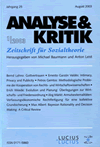Suchergebnisse
"Gebhard Kirchgässner"
Titel: Comment on Anton Leist: Comment on Anton Leist. Potentials of Cooperation (Analyse & Kritik 01/2011)
Autor: Gebhard Kirchgässner
Seite: 509-516
Abstract: I first discuss two aspects of a social order and cooperation which might be of high relevance: the problem of a spontaneous emerging of a social order, and the relation between exchange and cooperation. In doing so, I also discuss the role of production in separating areas of cooperation from those of competition. Second, I look more closely at the motivations for cooperative behaviour. It is argued that of the four kinds of motivation mentioned by Leist only two, self-interest and altruism, are really necessary to explain cooperation.
Titel: Critical Analysis of Some Well-Intended Proposals to Fight Unemployment
Autor: Gebhard Kirchgässner
Seite: 25-48
Abstract: In this paper it is asked whether it is meaningful to state a ’right to work’ as a basic human right to be written down in the constitution, for example, whether working time should generally be reduced, and whether those who do not have (or find) a job should get a guaranteed minimal income. All three demands have to be rejected, at least in the radical form in which they are often stated. They cannot be realised at all or at least not without impairing other basic human rights. Finally, it is asked what can be retained from these (usually well-intended) demands.
Titel: On Some Problems to Apply the Economic Model of Behaviour in Political Science
Autor: Gebhard Kirchgässner
Seite: 649-667
Abstract: After a short description of the economic model of behaviour it is shown that there are two reasons why problems arise if this model is applied to political processes and decisions. First, such decisions are often ’low cost’, i.e. ’wrong’ decisions have hardly any impact on the decision maker. Second, the behaviour of single individuals or small groups of individuals is to be explained. The common root of this problem is the difficulty to predict behaviour which is mainly preference governed and not guided by (changing) restrictions. Nevertheless, this should not lead to abolish the economic model because (i) it can be usefully applied also in this area and (ii) a better alternative is hardly available.
Titel: Normen und das ökonomische Handlungsmodell. Eine weitere Replik auf Gebhard Kirchgässner (ANALYSE & KRITIK 20, 221-244)
Autor: Jens Beckert
Seite: 138-141
Abstract: This note on my exchange with G. Kirchgässner points to a possible misunderstanding and one serious difference of opinion. On the empirical side I tried to make visible social values and norms which cannot be reduced to economic preferences. On the normative side I tried to criticise the rational-choice-approach for being either obviously wrong or empirically empty.
Titel: Triumph und Grenzen des Marktes. Erwiderung auf Gebhard Kirchgässners "Auf der Suche nach dem Gespenst des Ökonomismus" (Analyse & Kritik 19, 127-152)
Autor: Jens Beckert
Seite: 205-220
Abstract: While markets are important mechanisms for coordination of social ex-change it has to be looked at their limits and preconditions as well. This paper advocates three claims: First, under conditions of externalities and asymmetric dis-tribution of information the efficient functioning of markets depends on non-market institutions. Second, social limitations of the expansion of markets reflect a value- realm in which society constitutes itself. These values, though they change, are nor-matively immune against efficiency consideration. Third, the rational-actor model of economies is insufficient for the understanding of the non-rational preconditions of markets and the embeddedness of markets in social values.
Titel: Märkte, Normen und das ökonomische Handlungsmodell. Eine Replik auf Jens Beckert
Autor: Gebhard Kirchgässner
Seite: 221-244
Abstract: First it is shown that in order to function well markets depend on same preconditions even if there are no external effects and there is complete information. One of these conditions is that individuals follow some moral norms. Then it is asked whether these norms are non-consequentialist. There might be some norms for which no consequentialist foundation can be constructed. However, these are not the norms which have to be followed in order that a market system functions well. Such norm-following-behaviour can successfully be analysed with the economic model of behaviour, if the motivational assumption of this model is not artificially restricted to consider only financial incentives. Finally it is pointed to the fact that it is reasonable to employ the economic model of behaviour not only for analysing social processes but also for developing policy recommendations.
Titel: Auf der Suche nach dem Gespenst des Ökonomismus. Einige Bemerkungen über Tausch, Märkte und die Ökonomisierung der Lebensverhältnisse
Autor: Gebhard Kirchgässner
Seite: 127-152
Abstract: First, the role of markets as co-ordination mechanisms and, more generally, the role of exchange relations in a society is discussed. We consider illegal markets as well as markets where transactions are performed not using money but some other exchange medium. Secondly, we ask for the political possibilities to intervene into such markets. Finally, we discuss the increasing 'economising of social relations' and possible reasons for it.
Titel: Diskursethik, Politische Ökonomie und Volksabstimmungen
Autor: Bruno S. Frey / Gebhard Kirchgässner
Seite: 129-149
Abstract: First, the approaches of Diskursethik (Discourse ethics) and of Modern Political Economy are described. While the latter investigates political decision processes, the former is concerned with the discourse process which takes place before a decision is made. This is shown by using referenda as an example. The discourse which takes place before referenda obviously does not conform to the ideal conditions defined in Diskursethik, but discourse and decisions in the context of referenda come nearer to the intentions of Diskursethik and Political Economy than other decision procedures which are used in representative democracies.
Titel: Volksabstimmungen, Verhandlungen und der Schleier der Insignifikanz. Kommentar zu Bruno S. Frey / Gebhard Kirchgässners "Diskursethik, Politische Ökonomie und Volksabstimmungen"
Autor: Michael Baurmann / Hartmut Kliemt
Seite: 150-167
Abstract: To combine some views of 'Diskursethik' and Constitutional Political Economy seems to be promising. In our comments on Frey's and Kirchgässner's attempt to join the forces of Discourse theory and Political Economy in defending the wider spread use of referenda we direct attention to three points. Firstly, the normative basis of both concepts is unsettled. Secondly, an economic approach contrary to the supposition of Frey and Kirchgässner provides substantial insights into the processes which precede collective decisions. Thirdly, the 'veil of insignificance' in referenda will not necessarily increase altruism in voting behavior.
Titel: Die neue Welt der Ökonomie
Autor: Gebhard Kirchgässner
Seite: 107-137
Abstract: The article starts out with a sketch of the model of individual behaviour, basic for modern economic theory, including the consideration of typical criticisms. The model then is examined in its application first to micro- and macroeconomic theorizing, then to the economic analysis of politics and of law. It concludes by pointing out some drawbacks inherent in the economic approach to the social sciences: economic imperialism, conservativism and the illusion of manageability.

Work and Social Justice
2009 (31) Heft 1
Guest-Editor: Carsten Köllmann
Editorial
The labour market is among the most contested fields of political argument and conflict in our time. Public criticism of increasing wage inequalities and especially of excessive management pay is, notwithstanding its popularity, only a symptom of more fundamental changes going on in the labour market and in society at large. The conditions and the very meaning of work rank high on the agenda of Western societies. Persistent mass unemployment, coupled with an increasing number of working poor, co...

Der ökonomische Ansatz in den Sozialwissenschaften I
1988 (10) Heft 2
Editorial
Die Überzeugungskraft und der Erfolg des ökonomischen Ansatzes ist wesentlich verbunden mit seinem methodologischen Individualismus und seiner Theorie der rationalen Entscheidung: 1. Komplexe soziale Tatsachen werden erklärt durch Zurückführung auf ein einheitliches Fundament, dessen elementare Bedeutung für jedermann nachvollziehbar ist: auf individuelle Entscheidungen, die Menschen in bestimmten Situationen zwischen verschiedenen Handlungsmöglichkeiten treffen. 2. Diese Entscheidungen w...